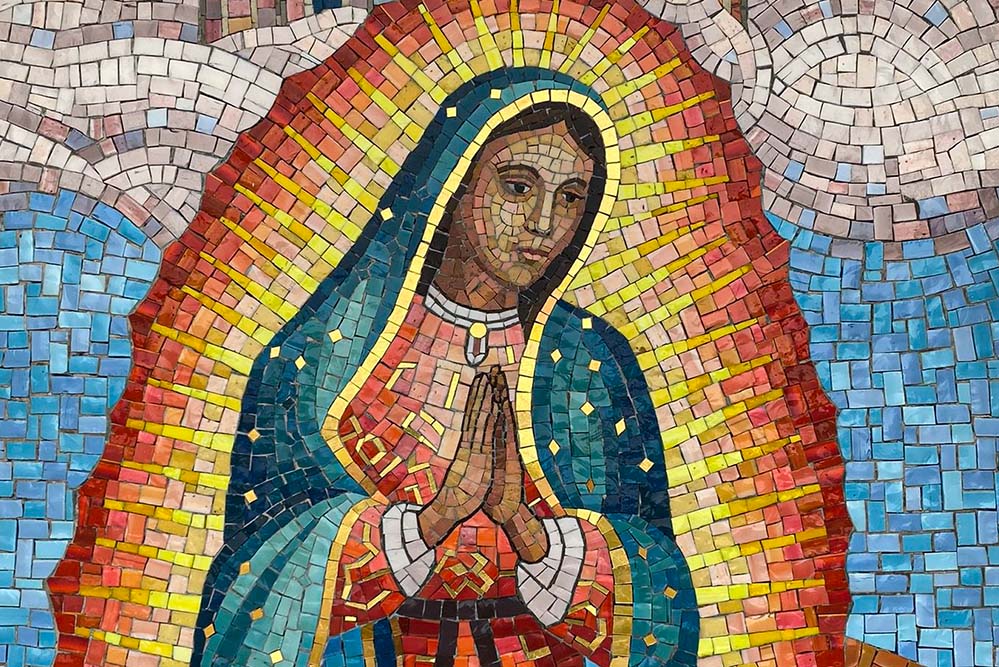
A mosaic depicts Our Lady of Guadalupe at a shrine to her at St. Juan Diego Catholic Church in Pasadena, Texas, Dec. 13, 2021. (CNS/Texas Catholic Herald/James Ramos)
I was heading to church last month for Mass to celebrate the Nativity of the Virgin Mary, when I scrolled through Instagram and saw former President Donald Trump share an image of the Virgin of Guadalupe. I felt outraged by this political exploitation of a sacred image.
But this wasn't an isolated incident. Groups like the Napa Institute have embraced the Virgin's image while praising a candidate whose policies are overtly anti-immigrant. At the Conservative Political Action Conference, Catholic members of the Republican Party expressed their devotion to the Virgin of Guadalupe, even as the event was marked by anti-immigrant rhetoric. In Florida, Latino conservatives even presented Trump with an image of the Virgin during a campaign event.
I was brought to this country at a young age by my parents. Through hard work and dedication, I achieved higher education, but my background has made me a target for those who discriminate against immigrants.
I am a devout Catholic who attends Mass every weekend. For Mexican immigrants such as me, the Virgin of Guadalupe symbolizes hope, liberty and unity. La Morenita del Tepeyac represents a divine intercession with God. According to tradition, the Virgin of Guadalupe, la Madrecita de los Immigrantes, embodies the spirit of care and protection for those on difficult journeys.
Just as the biblical story of how Mary and Joseph emigrated to Egypt to protect their child Jesus, thousands of Mexicans turned to her intercession as they journeyed to the United States. During the Chicano movement in the 1970s, for Catholic Mexican and Filipino peasants, the Virgin symbolized a relief against oppression and social inequality. Social activist Cesar Chavez made her image a central part of the rural protests in California, carrying it at the forefront of many demonstrations.
Using the Virgin of Guadalupe's image to promote far-right rhetoric is not only a betrayal of her true meaning, but an affront to those of us who turn to her for hope and guidance in our struggle.
For many Mexican immigrants, the Virgin of Guadalupe is a symbol of collective struggle and resilience. Her image should not be wielded as a crass political tool, but honored for its profound cultural and spiritual roots.
The attempt to co-opt her image for political gain reveals a troubling disregard for the sacred values she embodies and the struggles of those who hold her dear. Nuestra Virgencita symbolizes hope and refuge for the persecuted and the displaced. La Morenita, as we affectionately call her, represents immigrants like me — dreamers who aspire to a better life. The Virgin of Guadalupe is the mother who gives us compassion and protection.
Using her image to promote far-right rhetoric is not only a betrayal of her true meaning, but an affront to those of us who turn to her for hope and guidance in our struggle.
Pope Francis' recent comments urging American voters to choose the candidate they perceive as the "lesser evil" reflects the growing frustration of Catholic voters — many of whom feel increasingly disconnected from the candidates on the ballot.
With 20% of the American population identifying as Catholic, according to the 2020 census, it is clear that this demographic represents a significant portion of the electorate. Recognizing this, Trump has launched a campaign aimed explicitly at courting Catholic voters, seeking to align his message with their values. A group of Republican Catholics, Catholics for Trump, proclaimed on its website, "President Trump has stood unwaveringly in defense of traditional values and the sanctity of human life."
While the campaign seeks to rally support around Trump's policies, for many Catholics, the sanctity of life extends beyond anti-abortion stances to encompass issues like immigration, social justice, and poverty alleviation.
Advertisement
Most of the immigrants are Catholics, but those immigrants are increasingly distancing themselves from the church. According to the Pew Research Center, the percentage of Hispanic adults identifying as Catholic has plummeted from 67% in 2010 to just 43% in 2022. A major contributing element appears to be the anti-immigration sentiments expressed by some established Catholics in the U.S.
When members of a community feel unwelcome or marginalized by those who should be their allies, it creates a profound disconnection. Additionally, the lack of support from the clergy can leave immigrant families feeling isolated in their struggles, prompting them to seek solace in other religious institutions that may offer a more welcoming environment.
Francis' recent comments are a powerful reminder that political decisions carry significant moral weight. We cannot allow our faith to be co-opted as mere tools for political gain. Religious symbols and teachings should inspire genuine compassion and justice, not serve as superficial appeals to voters.
As we approach this pivotal election, let us not just heed the pope's words, but let's take them to heart. Let's thoroughly examine the values we wish to see in our leaders, and let these values guide our decisions. The choices at the ballot box should resonate with the deepest convictions and reflect a commitment to creating a society that embodies our principles.
Now is the time for deep reflection and aligning our political engagement with the values of our faith.








